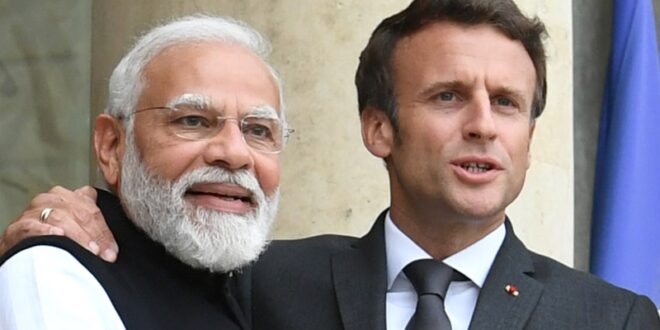Prime Minister Modi has just wrapped up a two-day visit to France, where he was guest of honour at France’s Bastille Day Parade. This is a rare honour, given that it’s not every year that the parade has a foreign chief guest—the last time was in 2018 when Singapore PM Lee Hsien Loong was the guest of honour.
This is Modi’s fifth visit to France, and President Macron himself has hosted him four times since coming to power in 2017, demonstrating the continued importance that the two countries attach to this partnership. The Modi-Macron ‘bromance’ was on full display, but the visit equally delivered on substance as much as symbolism.
In this multi-faceted partnership, collaboration spans a wide range of sectors including defence, climate change, energy transition, space cooperation, blue economy, multilateralism, and even counter-terrorism. France has been a consistent supporter of a permanent seat for India on the United Nations Security Council (UNSC). It has also actively supported India’s stances on Kashmir and terrorism at the United Nations (UN) as well as bodies like the Financial Action Task Force (FATF). Cooperation in the area of energy transition is also in full swing where the two countries, in 2015, launched the International Solar Alliance that has grown to include 100 odd countries.
Security cooperation at the centre
It is no surprise that defence deals were centre stage given that defence has traditionally been the strongest pillar of the partnership. France is India’s second largest arms supplier after Russia, and Russia’s depleting military arsenal due to the Ukraine conflict makes it likely for this cooperation to only intensify. A deal for 26 more Rafale fighter jets is in the works, this time for the Indian Navy, along with three Scorpene submarines. There are also talks of jointly developing engines for fighter jets. In this context, France has emerged as a key partner for India’s ‘Make in India’ initiative that aims to indigenise defence production. This security cooperation extends beyond arms deals, and the two countries also conduct regular joint military exercises and institutional exchanges.
For France, these lucrative deals make for great business, but seeing eye-to-eye with India on security issues such as stability in the Indo-Pacific region is also relevant. Both countries are resident powers in this region, where a major chunk of the world’s trade passes through and where China’s assertive actions are a cause for concern. With 1.5 million French citizens living in the region, France is the most active European power here. The Indo-Pacific was also a key priority during France’s presidency of the Council of the EU in early 2022. Strategic alignment between France and India has also enabled trilateral arrangements with like-minded countries such as Australia and the United Arab Emirates (UAE). In addition, the two countries launched an Indo-Pacific Trilateral Development Cooperation Fund in 2022 aimed at facilitating innovation-based development projects in the region.
The China factor is a central reason for India’s closer ties with Western countries and their courtship of India. The Russia-Ukraine war has served as a wake-up call for European countries with regards to their heavy economic dependence on China. For Europe, diversification and “de-risking” from China as well as striving for a rules-based global order and stability in the Indo-Pacific are now important ingredients in its policy-making. India is viewed as a country that can balance China economically and as a security provider in the Indo-Pacific. Deepening US-China strategic rivalry is also pushing middle powers India and France to engage more in pursuit of a multipolar world.
The pursuit of strategic autonomy
What also binds the two countries is their pursuit of “strategic autonomy” in their foreign policies—a concept India has practiced since its post-independence years during the Cold War, and one that France, under Macron’s leadership, has passionately encouraged at the European level.
However, in a relationship that continues to be dominated by security issues, trade has remained a laggard. This is in stark contrast to India’s ties with Germany, where economics forms the bulk of the partnership. The figures are telling—France is only India’s 11th largest foreign investor and in 2022, bilateral trade stood at US$15.8 billion, increasing consistently year on year, but still remaining below potential. Bilateral trade with Germany, on the other hand, stood at almost US$30 billion in the same year. The CEO forum held during this visit with business heads from both sides was part of an effort to address this lag. Yet it is through the conclusion of an EU-India Free Trade Agreement that the maximum trade potential between India and France could be unlocked.
India and France released a roadmap “Horizon 2047” to advance bilateral cooperation over the next 25 years, which will mark 100 years of India’s independence and 50 years of the India-France strategic partnership. This futuristic vision is only likely to catapult the relationship to greater heights.
Even before the Russia-Ukraine conflict, France had replaced Russia as India’s best friend. Perhaps, what is most special about this relationship is its deep-rooted trust and lack of baggage. And despite being a longstanding well-institutionalised partnership, the personal chemistry between Modi and Macron certainly helps.
 Eurasia Press & News
Eurasia Press & News




